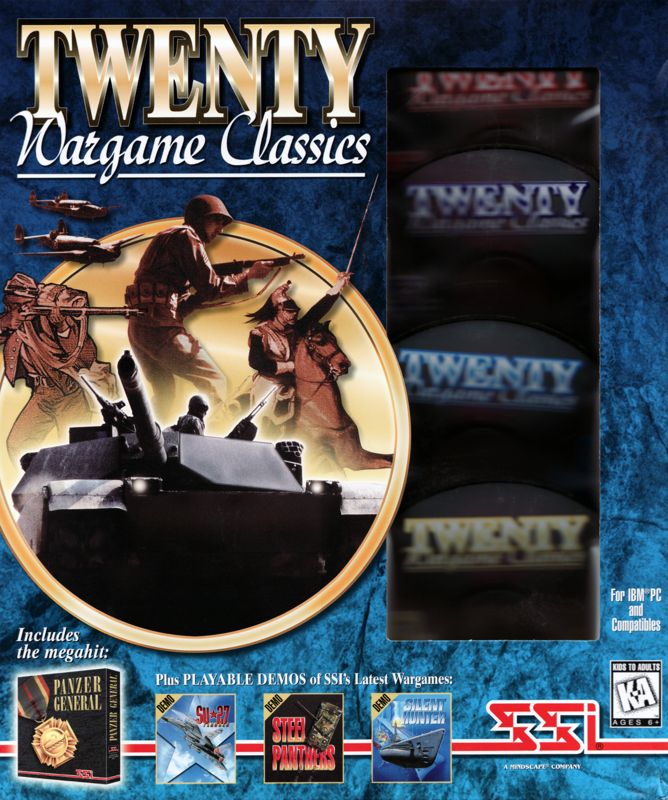Retro Replay Review
Gameplay
Twenty Wargame Classics brings together some of the most intricate turn-based strategy titles of the late 1980s and early 1990s, offering a staggering variety of operational and tactical scenarios. From Impressions’ “D-Day: The Beginning of the End” to SSI’s “Gary Grigsby’s War in Russia,” each title challenges players to master resource allocation, unit positioning, and supply lines. The layered mechanics demand careful planning, with depth that modern casual gamers may find daunting yet deeply rewarding.
The collection’s AI opponents vary in sophistication. Games like SSG’s “Decisive Battles of the American Civil War” volumes feature AI routines that follow historical doctrine, forcing players to anticipate genuine Civil War strategies. Meanwhile, SSI classics such as “Panzer General” (or “Great Naval Battles 3” in some regions) deliver aggressive computer commanders that can overwhelm unprepared formations. Replay value is high as the AI adapts to defensive and offensive postures, making each playthrough a fresh tactical puzzle.
Customization options are a highlight. Titles like “Warlords” and “Wargame Construction Set II: Tanks!” let veterans design their own maps, unit rosters, and victory conditions. This sandbox approach extends the collection’s lifespan far beyond the original campaigns. Even simpler interfaces, such as those in “Conflict: Middle East” or “Global Domination,” allow scenario tweaking, creating a playground for aspiring military theorists. Multiplayer hotseat adds another layer, pitting friends against one another in classic theater-of-war engagements.
Graphics
Visually, Twenty Wargame Classics wears its vintage roots proudly. The top-down hex grids of “Conquest of Japan” and “Western Front: The Liberation of Europe 1944–1945” convey information clearly, though unit icons and terrain tiles are minimalist by today’s standards. Color palettes are functional, differentiating armies and terrain but lacking the polish of modern effects. Players seeking cinematic visuals will find the aesthetic austere, yet there’s beauty in the clarity of each map’s design.
Some titles, like SSI’s “Battles of Napoleon,” incorporate simple animations for combat resolution, adding a dash of drama when formations clash. These brief flashes of cannon smoke and marching infantry inject personality into otherwise static encounters. Meanwhile, SSG’s “Gold of the Americas” and “Reach for the Stars” rely heavily on text and charts, with graphics serving more as supportive eye candy than immersive landscapes. The focus remains on data presentation over visual flair.
The user interface across the collection is utilitarian. Menus are text-heavy, with icons that require memorization. Tooltips exist but often lack clarity by modern standards. However, once accustomed to the controls and shortcuts, the compact interface becomes a strength, allowing rapid access to orders and status screens. Nostalgic players will appreciate the retro charm, while newcomers may need time to adjust to the dated UI conventions.
Story
Being primarily wargames, narrative takes a back seat to strategic depth. Nevertheless, each title frames its battles with historical context and scenario briefings. Impressions’ “When Two Worlds War” sets up an alternate WWI conflict with concise mission texts that evoke the stakes of trench warfare. Likewise, “MacArthur’s War” and “Halls of Montezuma” in the Battlefront series pepper in commanding officer goals and situational reports that bring the human element to operational planning.
SSI’s “Sword of Aragon” diverges by blending role-playing elements with its strategic map, offering a loose storyline about regaining a shattered kingdom. This hybrid approach adds character interactions and quest-like objectives, presenting a rare narrative thread among otherwise purely military simulations. While simplistic by modern RPG standards, it provides a welcome change of pace for players craving a light tale amidst the historical battles.
SSG’s “Decisive Battles of the American Civil War” volumes present scripted events and historical after-action reports, giving players a sense of progression through famous engagements. Although there’s no cinematic cutscene, each debrief reads like a dispatch from wartime correspondents, helping to ground the strategy in real-world significance. For history buffs, these tidbits often spark further research, transforming the collection into both a gaming and educational tool.
Overall Experience
Twenty Wargame Classics is a niche collection tailored for hardcore strategists and history enthusiasts. The sheer breadth of titles—from naval operations in “Carrier Strike South Pacific 1942–44” to grand campaigns in “Clash of Steel”—offers unparalleled coverage of 19th and 20th-century conflicts. While the learning curve is steep, the payoff is a multifaceted understanding of military logistics, battlefield tactics, and strategic planning that few modern titles can rival.
Installation and compatibility on modern systems can be a challenge, but the collection generally includes DOS-based executables or wrappers for Windows. Some graphical glitches may occur on high-resolution displays, requiring tweaks or community-made patches. Despite these technical hurdles, the experience of launching a beloved classic from your own youth or discovering a hidden gem makes the effort worthwhile.
In summary, this anthology is a time capsule, preserving the essence of early PC wargaming. Its depth, variety, and historical scope earn it a special place on the shelf of any serious gamer. Casual players may find the interfaces archaic and mechanics demanding, but for those willing to invest the time, Twenty Wargame Classics delivers an engrossing, multi-decade tour through warfare’s most pivotal moments.
 Retro Replay Retro Replay gaming reviews, news, emulation, geek stuff and more!
Retro Replay Retro Replay gaming reviews, news, emulation, geek stuff and more!




Reviews
There are no reviews yet.